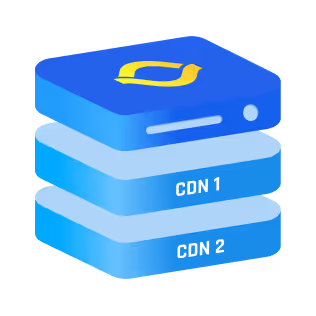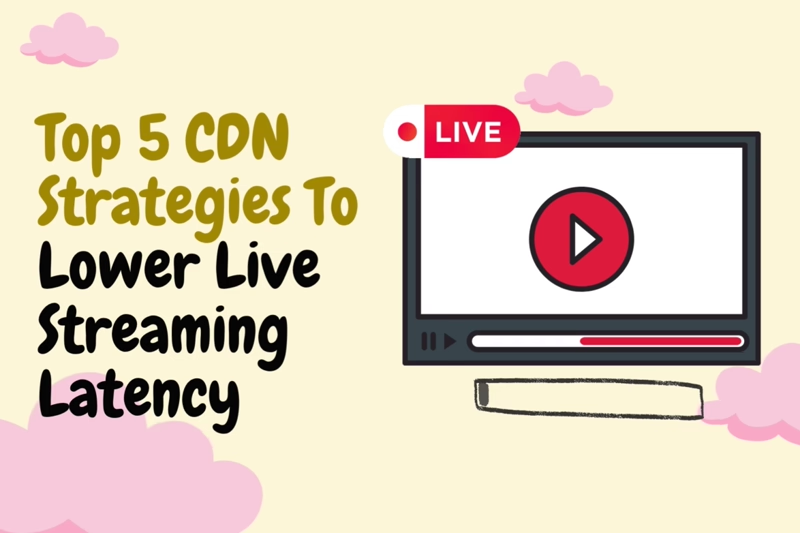Best API Gateway Tools & Solutions for 2025
We’re living in a world where digital transformation dictates market trends, the World Wide Web is constantly expanding, and there’s no shortage of content to consume. In this highly competitive ecosystem, managing a bunch of APIs can quickly become daunting, leading to inefficiencies.
.gif)
This is why a centralized hub, called API Gateway is so emphasized, especially when it comes to managing APIs. It enables your business to streamline operations, enhance security, and improve user experiences, but maintaining them without the necessary know-how and resources can be a challenge.
The Benefits of Implementing API Gateways
Simply put, an API gateway is a management tool that acts as a middleman between users and your application's services. It processes requests from users, directing them to the appropriate services, and then compiles the results into a cohesive response.
Here are some of the main benefits it can provide:
- API gateways streamline the management of APIs, offering a mix of open-source and proprietary tools for businesses to find their perfect match. The key to this simplification is a unified entry point for all API interactions, making it easier to monitor, maintain, and update APIs.
- They bolster security by serving as a protective barrier. They implement crucial safeguards such as authentication, authorization, and encryption, ensuring sensitive data remains secure across networks.
- API gateways handle load balancing to even out request distribution across servers and use response caching to lessen backend load, enhancing user response times. As demands grow, they enable services to scale efficiently, handling increased traffic with ease.
- There’s also added control over traffic flow through rate limiting, safeguarding your system from overload by any single user or service. Setting quotas limits the number of requests a user can make in a given timeframe, further securing your system against excessive use.
- Gateways provide a centralized point for analytics, offering a detailed view of API traffic. This enables in-depth analysis of usage patterns, identifying areas for improvement. They also yield insights into service utilization, guiding future development strategies.
How to Choose the Right API Gateway Tool?
We’ve discussed how it’s absolutely necessary to go for the best-suited option, but how does one determine that? There are a couple of factors at play here, each necessitating a keen eye:
What Are Your Specific Requirements?
Start by outlining what you specifically need from an API gateway. Here are some questions you can ask yourself:
- Are you looking for enhanced security features, such as JWT authentication or OAuth?
- Do you need support for a high volume of requests per second?
- Can the API gateway be tailored to fit your unique business logic, routing rules, and processing requirements?
- Does the API gateway support protocols and standards such as HTTP/2, WebSocket, and gRPC?
There’s a lot to ask, but whether you're working with a microservices architecture, a monolithic setup, or something in between, your API gateway should painlessly integrate with your existing infrastructure.
Look for tools that support your architectural model and provide the necessary integrations for smooth operation.
Evaluate the Features
First, assess the gateway's ability to handle your expected traffic volume and grow with your business. Can it manage load balancing effectively? How does it handle caching? The right tool will ensure high performance and scalability, even during peak traffic periods.
Next, evaluate the gateway's security features, including encryption, rate limiting, and access control. The ability to protect your APIs from common threats and vulnerabilities is non-negotiable.
Consider the developer experience. A good API gateway offers comprehensive documentation, an intuitive interface, and tools that simplify API management. This can significantly reduce development time and improve efficiency.
Visibility into your API's performance and usage is also essential for continuous improvement. Choose a gateway that provides detailed analytics and monitoring capabilities, allowing you to track everything from response times to usage patterns.
Open Source vs. Proprietary
Open source API gateway tools offer flexibility and the opportunity for customization. They can be a cost-effective option with strong community support. However, consider the potential need for in-house expertise to manage and customize the tool to your needs.
Proprietary gateways often come with premium support, advanced features, and regular updates. While they may come at a higher cost, the investment might be justified by the ease of use, reliability, and support services provided.
Evaluate
Before making a final decision, conduct pilot tests with shortlisted gateways. This allows you to evaluate their performance and suitability for your environment in real-world scenarios.
Look into the support and community surrounding the gateway. An active community can provide valuable resources and troubleshooting help, while strong vendor support can ensure quick resolutions to potential issues.
10 Best API Gateways and Management Tools
This list of API gateway tools offer comprehensive capabilities from API design and testing to security, monitoring, and analytics, facilitating a streamlined API lifecycle management experience:
.jpg)
1. Kong Gateway
Designed to cater to businesses of all sizes, Kong ensures a consistent developer experience with real-time analytics and a scalable infrastructure.
Built on Nginx, it's known for being lightweight, fast (claiming capability over 50,000 TPS per node), and cloud-native. Kong emphasizes deployment agnosticism (hybrid, multi-cloud, Kubernetes, serverless) and automation via declarative configuration (APIOps). Its ecosystem includes Kong Konnect (SaaS/Hybrid control plane) and increasingly, AI-focused capabilities.
Kong Gateway allows for secure management of APIs across any cloud, team, gateway, protocol, or architecture from a single interface, making it a pivotal tool for modern digital infrastructure management.
Key Features:
- Centralize control over your APIs across diverse environments and architectures.
- Tailor with an expansive plugin ecosystem for specific security, monitoring, and functionality needs.
- Handle applications of any size, ensuring API performance and reliability.
- Enhance orchestration and management with native support for Kubernetes.
- Utilize AI-driven insights for advanced API management and optimization.
Pricing: Adopts a flexible pay-as-you-go billing model, with $500 of free credits to kickstart your API management. The gateway itself is open source and free, with self-managing options.
2. Google Apigee
As part of the Google Cloud Platform, Apigee has popularized itself with capabilities for large-scale API deployment and integration.
It offers full lifecycle management with a strong focus on analytics, security, monetization, and increasingly, AI integration leveraging Google's ecosystem.
Apigee supports hybrid/multi-cloud deployments via Apigee Hybrid.
Key Features:
- Automated controls with AI/ML for secure API construction.
- Support for REST, SOAP, GraphQL, or gRPC architectural styles.
- Flexible pricing options, including pay-as-you-go or subscription models.
- Duet AI for automatic OpenAPI specification generation and API proxy creation.
- Advanced API security with ML-based abuse detection.
- High-performance API proxies for traffic management of demanding applications.
- Hybrid/multicloud deployments for architectural freedom.
Pricing: Apigee offers three pricing tiers: an evaluation model with a 60-day free sandbox, a pay-as-you-go model starting at $20 per 1M API calls, and a subscription model with custom pricing for enterprises.
3. Amazon API Gateway
Amazon API Gateway is AWS's fully managed service for creating, publishing, securing, and monitoring APIs at scale. It acts as a front door for applications accessing backend services, tightly integrated with the AWS ecosystem, particularly Lambda for serverless architectures.
Amazon’s API Gateway also features integration with AWS IAM and Amazon Cognito for authentication/authorization. Native OIDC and OAuth2 support. Lambda authorizers for custom logic, and has standard features like TLS encryption baked in.
API Types:
- HTTP APIs: Optimized for serverless/HTTP backends, lower cost, primarily proxy functionality.
- REST APIs: Offer API proxy and broader management features (throttling, caching, etc.) in one solution.
- WebSocket APIs: For real-time, bidirectional communication applications.
Key Features:
- Deep integration with AWS Lambda, enabling serverless API backends. Also supports other AWS services and HTTP endpoints.
- Request throttling, bursting controls, caching capabilities for performance optimization.
- Integration with Amazon CloudWatch for metrics (API calls, latency, errors) and logging. Dashboard for visualization.
- Designed to handle hundreds of thousands of concurrent calls.
- Features for managing multiple API versions, SDK generation.
Pricing: Free tier includes 1 million API calls/month for 12 months (REST and HTTP APIs). Pay-as-you-go uses tiered pricing based on API calls received (per million), data transferred out (per GB). Separate pricing for REST, HTTP, and WebSocket APIs. Caching costs extra based on cache size.
4. Microsoft Azure API Management (APIM)
Azure API Management (APIM) is Microsoft's hybrid, multi-cloud platform for securing, publishing, and analyzing APIs across environments.
It provides a unified experience for managing internal and external APIs, integrating deeply with the Azure ecosystem while offering flexibility through self-hosted gateways.
Note: The legacy direct management API is being retired March 15, 2025, requiring migration to the ARM-based API.
Key Features:
- Self-hosted gateways allow deploying APIM capabilities on-premises or in other clouds, managed from Azure.
- Rich policy engine for routing, security (authN/authZ), throttling, caching, transformations, load balancing, circuit breaking. Supports REST, WebSockets, GraphQL, SOAP, gRPC.
- Comprehensive features including securing LLM endpoints, token tracking/quotas, semantic caching, smart load-balancing for AI models, prompt/content safety integration.
- GitHub Copilot integration for API specification generation/refinement; Microsoft Copilot in Azure for policy authoring/troubleshooting.
- Out-of-the-box, customizable portal for API discovery, documentation, testing, and access management.
- Centralized inventory for all APIs (Azure-hosted or elsewhere), tracking metadata, lifecycle stages, deployments. Enforces design rules and compliance via linting in VS Code and reports. Workspaces enable federated management.
- Integration with Azure Monitor and Application Insights for logs, metrics, dashboards on usage, latency, errors.
- Supports CI/CD via ARM templates, Bicep, Azure CLI, Terraform, SDKs.
Pricing: Azure APIM has five basic tiers: Consumption (serverless, pay-per-execution), Developer (non-production/testing), Basic (entry-level production), Standard (general-purpose), and Premium (enterprise-grade with multi-region support).
5. KrakenD
KrakenD is a leading high-performance, open-source API gateway designed for stateless architectures, emphasizing simplicity and scalability. It excels in environments that demand high throughput and dynamic scalability, supporting unlimited endpoints and backends. KrakenD emphasizes simplicity (single binary, declarative config), speed (claiming 70k-80k RPS ), and linear scalability.
Key Features:
- True linear scalability on stateless architecture.
- Supports over 70,000 requests/second on commodity hardware.
- Automated data transformation, aggregation, or removal for efficient API management.
- Built for performance with a low consumption of resources.
- Configurable via a simple JSON file or the KrakenDesigner GUI for ease of use.
- Filter fields, enrich responses, transform data (e.g., SOAP/JSON/XML conversion). v2.9 adds YAML encoding support.
- Stateless design allows for scaling without single points of failure.
- Offers extensive security options including OAuth, SSL certificates, and zero-trust policies.
- Compatible with multiple architectural styles including REST, SOAP, GraphQL, and gRPC.
- Extensible with plugins, embedded scripts, and support for asynchronous agents.
Pricing: KrakenD is open-source and free to use, offering a cost-effective solution for organizations looking to implement a high-performance API gateway without the burden of licensing fees.
6. Gravitee.io
Gravitee.io "event-native" API Platform offers an intuitive, Java-based framework for comprehensive API management. It encompasses modules for API management, access management, and an alert engine, ensuring multi-tenancy support alongside a variety of security features.
Gravitee can handle both synchronous (REST, etc.) and asynchronous/event-driven APIs (Kafka, MQTT, WebSockets) within a single solution.
Ideal for businesses seeking a robust API management solution, Gravitee.io streamlines the process of managing, securing, and exposing APIs across different protocols and event brokers.
Key Features:
- Supports a wide range of API types, protocols, and event brokers, including REST, SOAP, Websockets, Webhooks, Kafka, MQTT, and more.
- No-code API Designer for easy API creation and importation, facilitating rapid API development and deployment.
- Policy Studio for crafting policy flows that enhance API and data stream security, reliability, and resilience.
- Developer Portal to promote API discoverability, allowing consumers to find, subscribe to, and engage with APIs effectively.
- Cloud-agnostic, supports multi-gateway/multi-broker environments. Community and enterprise options. Docker downloads available.
Pricing: Gravitee.io's pricing structure is divided into four tiers: Open Source, Planet, Galaxy, and Universe. Prices range from a base subscription of $2,500/month for the Planet tier to contact-based pricing for Galaxy and Universe tiers, which offer more advanced features and higher levels of customer support.
7. Solo.io Gloo Gateway (formerly Gloo Edge)
Solo.io Gloo Gateway is a Kubernetes-native ingress controller and API gateway, built atop the robust Envoy Proxy. It is tailored for hybrid applications, facilitating seamless interactions across various technologies and clouds.
Gloo Edge contrasts itself with traditional API management, emphasizing unified connectivity across all traffic directions (north-south, east-west, egress) and environments (multi-cloud, VM, serverless) via a federated control plane.
Zero Trust security and integration with AI/LLMs (via Gloo AI Gateway) are core tenets.
Key Features:
- Based on the powerful Envoy Proxy, offering high performance and reliability.
- Fully conformant with the Kubernetes Gateway API, ensuring seamless integration and broad compatibility.
- Supports function-level routing, allowing precise control over API traffic and enabling direct invocation of specific functions.
- Hybrid app support, enabling the routing of requests to backends implemented as microservices, serverless functions, and legacy apps.
- Integrates with a wide range of open-source projects for enhanced functionality. (including WASM)
- Offers robust discovery capabilities, automatically cataloging and updating available destinations.
Pricing: Gloo Edge offers an open-source version with community support, while enterprise-grade features and support are available under a subscription model.
8. Apache APISIX
Apache APISIX represents a high-performance API gateway designed for modern architectures, leveraging Nginx and etcd for efficient traffic management, load balancing, and security enforcement.
It's built to support HTTP, HTTPS, TCP, and UDP protocols, offering developers a flexible architecture to accommodate a wide range of applications.
APISIX’s governance under the neutral Apache Software Foundation (ASF) mitigates vendor lock-in risks associated with some company-controlled open-source projects.
Key Features:
- Extensive traffic management capabilities including load balancing, dynamic upstream, canary release, and circuit breaking.
- Rich plugin ecosystem (~100 plugins) and support for custom plugins (Lua, Go, Java, Wasm).
- Comprehensive security measures with support for various authentication methods and observability features.
- Utilizes radix tree route matching and etc for high-speed system synchronization and minimal latency.
- Integrates with Prometheus, OpenTelemetry, Datadog, SkyWalking, etc.
- Multi-protocol support ensuring compatibility across HTTP, gRPC, WebSockets, Dubbo, MQTT, and more.
- Highly scalable, enabling custom plugin development and custom load balancing algorithms.
Pricing: Apache APISIX is an open-source project, available for free. Organizations can deploy and customize it according to their needs without any licensing fees.
9. WSO2 API Microgateway
WSO2 API Microgateway, more suited in the context of microservices as an open-source, cloud-native gateway that excels in handling lightweight operations.
WSO2 emphasizes a unified control plane (ACP) for managing diverse gateway deployments, significant AI-driven governance and AI gateway capabilities, and strong support for Kubernetes-native environments.
Its open-source core offers flexibility and avoids vendor lock-in. The platform includes various gateway runtimes, including the traditional Synapse-based gateway, a Kubernetes-native gateway (formerly APK), and an Immutable Gateway (formerly API Microgateway).
Key Features:
- Leverages OpenAPI Specification for collaborative API development.
- Offers rate-limiting, service discovery, and security features.
- Facilitates message security, transport security, and routing.
- Enables developers to define API endpoints using standard OpenAPI definitions.
- WSO2 Copilot enables natural language API creation and refinement for REST, GraphQL, AsyncAPIs
- Simplifies the management of APIs with capabilities for message transformation and schema validation.
- Supports REST, GraphQL, WebSockets, Streaming APIs, gRPC, SOAP, plus integration capabilities via Micro Integrator (Kafka, AMQP, JMS, etc.).
Pricing: As an open-source solution, WSO2 API Microgateway is available at no cost. WSO2 manages the platform in a dedicated single-tenant environment as well. Requires contacting sales.
10. MuleSoft Anypoint
MuleSoft Anypoint, part of Salesforce, is a leading unified platform primarily focused on integration (iPaaS) but with strong API management capabilities.
MuleSoft emphasizes "Universal API Management" for flexibility, developer productivity via Anypoint Code Builder, and seamless connectivity within the Salesforce ecosystem.
Ideal for complex digital environments, it empowers organizations to connect any data, system, or AI model securely, automate tasks and processes, and enhance productivity across the board.
Note: Extended support for older Anypoint Studio versions (pre-7) ends March 2025
Key Features:
- Automate business processes across various systems, including legacy ones, with AI-powered API gateway management tools.
- Graphical interface and AI-powered natural language prompts streamline development for both developers and business users.
- Offers a comprehensive toolset for integration, APIs, and automation to speed up IT project delivery.
- Deployment flexibility across any environment with Anypoint Flex Gateway and support for CloudHub, Docker, and Kubernetes.
- Advanced security features including automatic compliance with ISO 27001, SOC 2, PCI DSS, and GDPR.
Pricing: MuleSoft Anypoint offers a starting free trial with subsequent pricing details available upon request. The platform encourages organizations to explore their capabilities with an initial hands-on experience before committing financially.
Conclusion
In essence, API gateways not only simplify API management through a centralized platform, but also facilitate integration, scalability, and monitoring of digital services. This is what makes them so important, and choosing the correct option can make a day and night difference in your business’s delivery.
FAQs
Why Should You Use an API Gateway?
An API gateway simplifies how clients interact with services by centralizing routing, load balancing, and access control. It’s a core component in modern architectures, especially microservices. The best API gateway solutions reduce backend complexity while improving scalability, observability, and reliability—all from a single, managed entry point.
How Do Open Source API Gateways Compare to Proprietary Solutions?
Open source API gateway options are flexible, customizable, and budget-friendly. They're ideal for teams with DevOps experience. In contrast, proprietary API gateway solutions offer richer UIs, enterprise-grade support, and easier setup. The right choice depends on your team's needs, infrastructure maturity, and whether you prioritize control or convenience.
What Features Should You Look for in the Best API Gateway?
The best API gateway should support routing, rate limiting, caching, API authentication (OAuth2, JWT), logging, analytics, and protocol compatibility (REST, gRPC, GraphQL). Open source API gateway tools may provide modular add-ons, while premium gateways often bundle advanced features like SLA-backed support, RBAC, and CI/CD integrations.
How Can an API Gateway Improve Security?
An API gateway improves security by enforcing authentication, authorization, and rate limiting before traffic hits your backend. Top-tier API gateway solutions also include threat detection, DDoS protection, input validation, and encrypted traffic policies. Whether using a proprietary or open source API gateway, centralized security helps reduce vulnerabilities.



.png)
.png)

.png)





